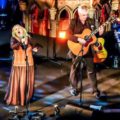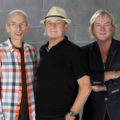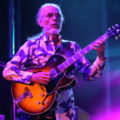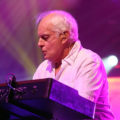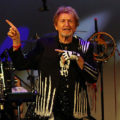“Grumpy Old” Rick Wakeman renews solo piano show stocked with Yes, sessions and surprises
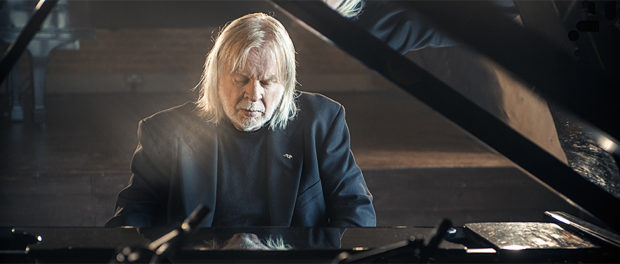 Photo provided by Chipster PR
Photo provided by Chipster PR
Rock and Roll Hall of Famer Rick Wakeman is the frequent piano and keyboard wizard behind progressive rock titans Yes, but when he’s by himself, takes a more intimate approach to those instruments. For the upcoming “Grumpy Old Rock Star” Tour (his first alone in America for 13 years), that means stripped down versions of band’s classics, solo selections, session work and surprises. Prior to his Arcada Theatre appearance on Oct. 4, Chicago Concert Reviews received a phone call from the cape-bearing artist/actor/author that turned out to be regularly insightful and anything but grumpy.
Do you have any recollections about coming to Chicago over the years that really stand out?
Rick Wakeman: Oh yeah, I’ve got a few. The standout one was not that long ago cause I’m a massive Cubs fan, so coming to Chicago during the great [World Series] win was fantastic for me. I’ve been a Cubs fan since 1985 and I’ve suffered along with many other Cubs fans over the years. It was also sort of a funny and interesting one for me because I have an American daughter, who lives in Cleveland, and she’s a massive Indians fan. So you can imagine coming up to the last game how, perhaps, our phone calls weren’t the friendliest! Apart from the Cubs, Chicago is one of the first cities I played with Yes in 1971. If I recall correctly, a lot of the “Yessongs” triple live album was recorded in Chicago.
It’s been 13 years since you’ve toured America solo. What have you missed most about this type of show?
Wakeman: Well, to be honest, I’ve been doing the piano show, along with all the silly comedy stories and things, in England for the last 30-odd years. Not all the time, but I do quite a lot of one-offs and then a small tour or whatever. I do it all the time, so I don’t miss it, however, I have missed doing it here. It’s such a fun show. It’s a bit like having the audience in the front room of my house, just playing away and telling stories, a bit like you would almost like at a dinner party. It’s a really lovely, intimate thing to do and I do love doing it I must admit.

Photo provided by Lee Wilkinson
Wakeman: I play my music on the piano that I’ve been involved with over the years. I don’t sing. You don’t want to hear me sing. I want people to stay, so I play piano! I do pieces from Yes, some of my own and pieces I’ve been involved with [from other artists] like David Bowie and Cat Stevens. I do a few surprising things. It’s a real mixture of all kinds of music. I sometimes through in even a bit of Dixieland, a couple of classical pieces from my classical influences, intermingled with lots of completely ludicrous stories of things that have happened in my life.
What do you remember most about working on those David Bowie sessions in particular?
Wakeman: Oh they were just wonderful to do. I used to do a lot of sessions. If you’re playing great music, then it was just an absolute pleasure. Sometimes you’d do sessions and us as session musicians had to try and turn a pretty average piece into something that was a bit better. With David, he turned up with the most amazing pieces of music that were just a joy to play on. His standard of musicianship, his writing and how he thought about music was just phenomenal. I never worked with anybody else like him. To work with David was really something very special.
What’s made you go in and out of Yes for so long?
Wakeman: To quote the title of that country and western song that really fits it perfectly with Yes: “How Could I Miss You If You Never Go Away?” And it is. There’s an element of that. Somebody once wrote that my relationship with Yes was similar to that of Richard Burton and Elizabeth Taylor. We couldn’t live with each other, but couldn’t live without each other. There’s a lot of truth in that!
Why has it been so challenging to keep everyone together?
Wakeman: I suppose when you’ve got a lot of very strong personalities in the band. It is difficult, but we’re much better now. [Singer] Jon [Anderson] and I work so well together because we obviously respect each other. We respect each other’s musicianship, and when somebody comes up with an idea, we’ll listen and go “oh yeah, that sounds good.” “Hey Rick, have you thought about playing that there?” “Oh, I’ll try it, that works.” or I’ll say to Jon: “There’s a harmony there you could do.” “Oh, okay.” The same with [guitarist] Trevor [Rabin]. It works all the way around. A few years ago we couldn’t do that. To suggest to somebody else that they do something, it probably would’ve ended up on “Forensic Files.” “They found this guy with a guitar neck rammed down his throat!” We’re much more amenable these days…Yes is a difficult relationship if you want to get it right. We used to argue a lot, but the end result was always worth all of that.
What’s the current status of Yes featuring ARW?
Wakeman: We’re working on putting together sort of a final farewell in 2020 and 2021 where we’ll do 70 or 80 shows going around just basically as a thank you to all the fans who’ve supported us over the years and that will be it. And hopefully leave with one last classic piece of music that we’ll write and put together, as a last memory I suppose.

Photo provided by Deborah Anderson
Wakeman: That will be the line-up. There’s not going to be another reunion like there was with the “Union” Tour in 1989 and ‘90. No, that wouldn’t happen.
What did being inducted into the Rock and Roll Hall of Fame mean for you personally?
Wakeman: Well, it was great. I felt a little bit of sadness that [bassist] Chris [Squire] sadly had passed away and wasn’t there. If anybody from Yes deserved to be there and be inducted, it was Chris, so I was sad he wasn’t there. There were so many people who’d been in Yes. In fact, I looked out at the 17,000-plus audience and realized most of them had been in Yes at some time! I was very proud that Yes got inducted in. I think they deserved to have gotten in years and years before. I would’ve put the band in the late ‘80s after “90125” because any band from the prog era that could produce a record in the punk era that was a massive number one and huge seller and success deserved to go in the Rock and Roll Hall of Fame.
Did you prefer any particular progressive or pop era of the band or are you open to everything?
Wakeman: I’d like to think I’m open to everything. One of the things that’s important to remember regarding Yes is not only have I played in the band, but I’m also a fan. So as a fan, I’m entitled to make my opinions like everyone else and say “I don’t like that album” or “I like that.” Just because I’m in the band doesn’t mean I have to say I like everything. To me, there are some glory years and some glory albums and they are quite simply “Fragile,” “Close To The Edge,” “Going For The One” and “90125.” They’re all important to the history of Yes. Without “90125,” there wouldn’t be a Yes today. I don’t think that all of the Yes albums that have been made, like “Keys to Ascension,” are the inspirational, exciting projects [along the lines of] the other ones that I mentioned. That’s because recording’s changed so much. We used to sit in rehearsal rooms for three or four months putting music together. Now everything is done with files sent via email or whatever and that interaction of working between each other has disappeared a bit, which is a shame, but it’s sorta difficult. I live on the east coast of England, Jon lives in Northern California and Trev lives in Hollywood, so we can’t phone each other up and say “let’s meet for coffee.”
In between all these projects, your solo and film scoring career also soared. What are the ones that stand out the most for you in that regard?
Wakeman: The last two piano albums [2017’s “Piano Portraits” and 2018’s “Piano Odyssey”]. I’m very fond of them because when you’re just using a piano, you’re so exposed and I was really pleased with the way they came out. As for bigger stuff, I re-did “Journey To The Centre Of The Earth” and “The Myths And Legends Of King Arthur And The Knights Of The Round Table” and I was very pleased with those. Then there’s “Return To The Centre Of The Earth,” which I liked a lot. I did a prog album with the English Rock Ensemble that disappeared without a trace, called “Out There.” There was some great playing and some great vocalists, but it wasn’t with a major record company and their idea of promotion was to open the window, hang it out for two minutes, say “hey, have a look at this” and then bring it back in again, so it disappeared without a trace, which is a real shame.
Do you feel like any of your music has gotten attention it might not have the first time around because it’s now available on all the online platforms?
Wakeman: Yes, certainly stuff like “King Arthur” and “Journey.” We did some really big concerts with orchestras, choirs and the whole kitchen sink and it was interesting that the audience was full of people that said “we never had a chance to see this the first time around.” It’s interesting there are people who are getting stuff the second time around, which is great.

Photo by Andy Argyrakis
Wakeman: I’d love it, but the trouble is it’s very expensive. If I’m brutally honest, I can sell out two Royal Albert Halls with 6,000 people for each show with ease to do “Journey” or “King,” but I couldn’t do that here. These shows cost a fortune of money to do. The only way to be humanely possible would be to have record company support and sponsorship. I would love to because I did “Journey” back in ‘75 with an orchestra and choir and band and it was just sensational. I would jump through hoops to be able to do that again!
Are there any special types of projects you’ve always wanted to try that you haven’t yet?
Wakeman: Yeah, there’s one that I’m working on at the moment with Tim Rice. I’ve always wanted to do a big musical. We’re working on one at the moment, which hopefully will see the light of day in late 2021.
Can you give us a preview or is it a surprise?
Wakeman: No, I’m not allowed to. Would you believe I had to sign away confidentiality? Like anything Tim Rice does, it’s going to be a really serious musical.
You also have a pair of best-selling books to your credit. How natural of a progression was it to go from an artist to an author?
Wakeman: It wasn’t that difficult to be honest with you. I was asked to write these books [“Grumpy Old Rock Star” and “Further Adventures Of A Grumpy Old Rock Star”] and I didn’t find it difficult at all. I think if I was writing a novel or something like that, that might be a whole different ballgame, but I was just writing down my experiences as they were, so it wasn’t difficult. I spent quite a lot of time doing it and going back over it. I also spent a lot of time talking to people, like my band of musicians I’ve worked with. “I remember this happened. Am I right?” They would come back, “yeah you’re right there. Do you remember you did this as well?” “Oh really?” You start adding things that they reminded you about. The books are colorful, that’s for sure.
The material is so hysterical, but I bet a lot of people didn’t expect that because a band like Yes is full of such studious musicians. Do you think that surprised people?
Wakeman: Yeah, it did a bit because the band did have a persona of being ultra-serious in all respects and you can’t be like that all the time. Jon’s got a great sense of humor and he likes to laugh. [Guitarist] Steve [Howe] has always been a massive Monty Python fan. People sometimes go “What? Monty Python?” Oh yeah, he’s a huge Monty Python fan! So what’s the old expression? Never judge a book by its cover.
Did the books play into the title of the tour?
Wakeman: It got named because there was a big TV series called “Grumpy Old Men” [in England]. It was a fun comedy series and I was in every single program in all of the series. I got known in England as a grumpy old man and I’m known in England as much for doing comedy as I am for doing music. The publisher asked me to do books, but we couldn’t use ‘Grumpy Old Man’ because of the TV company and the production company. So we came up with ‘Grumpy Old Rock Star” and that stuck. My agent over here said “you have to call it that,” so it became the “Grumpy Old Rock Star” Tour!
Rick Wakeman performs at the Arcada Theatre on Oct. 4. For additional details, visit RWCC.com and ArcadaLive.com.

